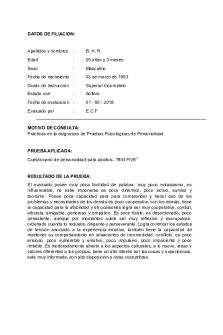Résumé Big Five - Resume de l\'article Personality Traits (“Big Five”) and the Propensity to Political PDF

| Title | Résumé Big Five - Resume de l\'article Personality Traits (“Big Five”) and the Propensity to Political |
|---|---|
| Course | Introduction à la recherche en sciences politiques |
| Institution | Université Libre de Bruxelles |
| Pages | 3 |
| File Size | 91.6 KB |
| File Type | |
| Total Downloads | 67 |
| Total Views | 130 |
Summary
Resume de l'article Personality Traits (“Big Five”) and the Propensity to Political Protest: Alternative Models...
Description
Used: 1. Data from interviews of the public 2. Models 3. Behaviorism approach 4. Existing research 5. Deductive research 6. Models 7. Statistics 8. Historical examples 9. Other studies 10. Data from surveys 11. Data from election results 12. Comparisons between models 13. Correlational research 14. Quantitative research
“Big Five” personality traits which lead to political protest (first proposed after the fall of the Berlin Wall and using citizens of former East Germany as interviewees in order to form the “Big Five” theory. 1
Conscientiousness Tendency to act dutifully, show achievement motivation, and self-discipline.
2
Neuroticism Emotional instability, tendency to experience anxiety, hostility, and self-doubt.
3
Agreeableness Being tender minded, straight-forward, cooperative, accommodating, and trusting.
4
Openness to Experience Ability to appreciate new experiences and having broad interests.
5
Extraversion Tendency to seek the company of others, external stimulation, joining in many activities, and enjoying being emotionally expressive.
Current theory supports previous theories which claimed rational choice, incentives, and collective action as direct causes of protest, and personality traits as distant causes.
Participation in political protests is caused by the circumstance or event, and the participants’ cognitive, emotional, motivational, and behavioral dispositions. All humans share these dispositions, but their intensities depend on the individual’s genes and personal history.
Using East Germany in 1989-90 as an example, with the circumstance being radical changes in the political system and reunification of Germany, gave citizens incentives (unemployment, financial insecurity, etc.) and opportunity (new and unstable government system) to protest. From 1990-92, 1/3 of all jobs were lost. Dramatic decline of marriage and births (50%) [Zapf, 2000, p.8]
Openness, Conscientiousness, Extraversion, Agreeableness, Neuroticism (Big Five) + Discontent, Influence, Social norms, Group membership, Critical friends and colleagues, Significant others (7 Incentives) = POLITICAL PROTEST
The Big Five traits and seven incentives influenced protest participation in 93 and 96.
The seven incentives are the strongest and most direct causes of protest participation. The Big Five traits are what determine these seven incentives, but alone, are much weaker causes of protest participation.
This article focuses on the direct influence of personality traits on political protest propensity (inclination to protest) rather than causes of protests. Protest propensity is unique to each individual, and depends on their tendency to both think about protesting and tendency to actually act in order to improve their own/collective socioeconomic situation.
Internal locus of control: the belief that a person’s successes in making great efforts to achieve a goal are due to personal skills and efforts. It is a trait that has often been related to political protest. (a higher locus of control = greater chance in participation.) Example-
female college students with a high locus of control were more willing to participate in Women’s Liberation activities. However, not a part of the Big Five.
The importance of personality traits varies depending on the specific social/political situation. Some circumstances could render personality traits more or less relevant.
Internal locus found to be a predominantly valid factor in participation in collective action.
Low scores in neuroticism and high scores in openness and extraversion lead to participation in collective action....
Similar Free PDFs

The Big Five Personality Test
- 1 Pages

Big Five Personality Types
- 5 Pages

Big Five Personality Types W2
- 5 Pages

BIG-FIVE- Interpretacion
- 3 Pages

Cuestionario Big Five
- 4 Pages

Le Modèle du Big Five
- 2 Pages

T-8 modelo dde los big five
- 13 Pages
Popular Institutions
- Tinajero National High School - Annex
- Politeknik Caltex Riau
- Yokohama City University
- SGT University
- University of Al-Qadisiyah
- Divine Word College of Vigan
- Techniek College Rotterdam
- Universidade de Santiago
- Universiti Teknologi MARA Cawangan Johor Kampus Pasir Gudang
- Poltekkes Kemenkes Yogyakarta
- Baguio City National High School
- Colegio san marcos
- preparatoria uno
- Centro de Bachillerato Tecnológico Industrial y de Servicios No. 107
- Dalian Maritime University
- Quang Trung Secondary School
- Colegio Tecnológico en Informática
- Corporación Regional de Educación Superior
- Grupo CEDVA
- Dar Al Uloom University
- Centro de Estudios Preuniversitarios de la Universidad Nacional de Ingeniería
- 上智大学
- Aakash International School, Nuna Majara
- San Felipe Neri Catholic School
- Kang Chiao International School - New Taipei City
- Misamis Occidental National High School
- Institución Educativa Escuela Normal Juan Ladrilleros
- Kolehiyo ng Pantukan
- Batanes State College
- Instituto Continental
- Sekolah Menengah Kejuruan Kesehatan Kaltara (Tarakan)
- Colegio de La Inmaculada Concepcion - Cebu








